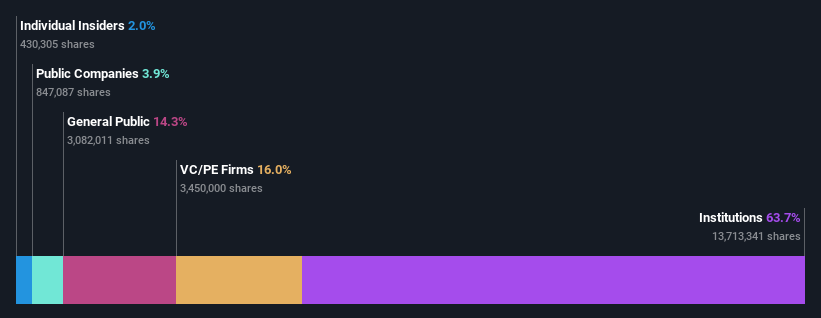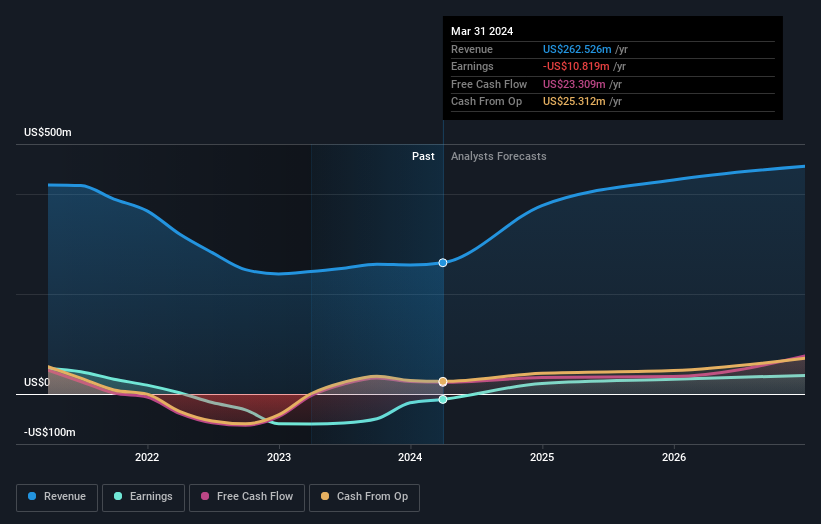- United States
- /
- Tech Hardware
- /
- NasdaqGM:HEAR
Turtle Beach Corporation's (NASDAQ:HEAR) US$34m market value fall may be overlooked by institutional investors after a year of 3.1% returns

Key Insights
- Given the large stake in the stock by institutions, Turtle Beach's stock price might be vulnerable to their trading decisions
- The top 11 shareholders own 52% of the company
- Recent purchases by insiders
If you want to know who really controls Turtle Beach Corporation (NASDAQ:HEAR), then you'll have to look at the makeup of its share registry. We can see that institutions own the lion's share in the company with 64% ownership. That is, the group stands to benefit the most if the stock rises (or lose the most if there is a downturn).
Institutional investors endured the highest losses after the company's market cap fell by US$34m last week. However, the 3.1% one-year returns may have helped alleviate their overall losses. They should, however, be mindful of further losses in the future.
Let's delve deeper into each type of owner of Turtle Beach, beginning with the chart below.
View our latest analysis for Turtle Beach

What Does The Institutional Ownership Tell Us About Turtle Beach?
Institutions typically measure themselves against a benchmark when reporting to their own investors, so they often become more enthusiastic about a stock once it's included in a major index. We would expect most companies to have some institutions on the register, especially if they are growing.
As you can see, institutional investors have a fair amount of stake in Turtle Beach. This suggests some credibility amongst professional investors. But we can't rely on that fact alone since institutions make bad investments sometimes, just like everyone does. When multiple institutions own a stock, there's always a risk that they are in a 'crowded trade'. When such a trade goes wrong, multiple parties may compete to sell stock fast. This risk is higher in a company without a history of growth. You can see Turtle Beach's historic earnings and revenue below, but keep in mind there's always more to the story.

Institutional investors own over 50% of the company, so together than can probably strongly influence board decisions. We note that hedge funds don't have a meaningful investment in Turtle Beach. Looking at our data, we can see that the largest shareholder is Diversis Capital, LLC with 16% of shares outstanding. Meanwhile, the second and third largest shareholders, hold 7.0% and 5.6%, of the shares outstanding, respectively.
After doing some more digging, we found that the top 11 have the combined ownership of 52% in the company, suggesting that no single shareholder has significant control over the company.
While it makes sense to study institutional ownership data for a company, it also makes sense to study analyst sentiments to know which way the wind is blowing. There are plenty of analysts covering the stock, so it might be worth seeing what they are forecasting, too.
Insider Ownership Of Turtle Beach
While the precise definition of an insider can be subjective, almost everyone considers board members to be insiders. Company management run the business, but the CEO will answer to the board, even if he or she is a member of it.
I generally consider insider ownership to be a good thing. However, on some occasions it makes it more difficult for other shareholders to hold the board accountable for decisions.
We can see that insiders own shares in Turtle Beach Corporation. As individuals, the insiders collectively own US$5.5m worth of the US$274m company. This shows at least some alignment. You can click here to see if those insiders have been buying or selling.
General Public Ownership
The general public, who are usually individual investors, hold a 14% stake in Turtle Beach. While this group can't necessarily call the shots, it can certainly have a real influence on how the company is run.
Private Equity Ownership
With a stake of 16%, private equity firms could influence the Turtle Beach board. Sometimes we see private equity stick around for the long term, but generally speaking they have a shorter investment horizon and -- as the name suggests -- don't invest in public companies much. After some time they may look to sell and redeploy capital elsewhere.
Public Company Ownership
We can see that public companies hold 3.9% of the Turtle Beach shares on issue. We can't be certain but it is quite possible this is a strategic stake. The businesses may be similar, or work together.
Next Steps:
I find it very interesting to look at who exactly owns a company. But to truly gain insight, we need to consider other information, too. Take risks for example - Turtle Beach has 1 warning sign we think you should be aware of.
If you are like me, you may want to think about whether this company will grow or shrink. Luckily, you can check this free report showing analyst forecasts for its future.
NB: Figures in this article are calculated using data from the last twelve months, which refer to the 12-month period ending on the last date of the month the financial statement is dated. This may not be consistent with full year annual report figures.
Valuation is complex, but we're here to simplify it.
Discover if Turtle Beach might be undervalued or overvalued with our detailed analysis, featuring fair value estimates, potential risks, dividends, insider trades, and its financial condition.
Access Free AnalysisHave feedback on this article? Concerned about the content? Get in touch with us directly. Alternatively, email editorial-team (at) simplywallst.com.
This article by Simply Wall St is general in nature. We provide commentary based on historical data and analyst forecasts only using an unbiased methodology and our articles are not intended to be financial advice. It does not constitute a recommendation to buy or sell any stock, and does not take account of your objectives, or your financial situation. We aim to bring you long-term focused analysis driven by fundamental data. Note that our analysis may not factor in the latest price-sensitive company announcements or qualitative material. Simply Wall St has no position in any stocks mentioned.
Have feedback on this article? Concerned about the content? Get in touch with us directly. Alternatively, email editorial-team@simplywallst.com
About NasdaqGM:HEAR
Turtle Beach
Operates as an audio technology company in North America, Europe, the Middle East, and the Asia Pacific.
Undervalued with excellent balance sheet.

